In August 1972, at an isolated naval base in Trelew, Argentina, military officers shook nineteen political prisoners out of their sleep in the middle of the night, lined them up against a wall and opened fire with lethal weapons. Sixteen died and three survived. This event came to be known as the Trelew Massacre.
Despite public outcry, the victims’ families were prevented from obtaining information and justice by the existing and successive authoritarian regimes. It was not until 2012, three decades after Argentina’s return to democracy, that most of the officers responsible for the massacre were prosecuted and found guilty in Argentinean courts. One, however – Roberto Guillermo Bravo – has evaded justice while living in the United States since 1973. On June 27, 2022, Bravo will finally stand trial in Miami, Florida for his alleged role in the Trelew Massacre.
In 1971, the Argentine military installed General Alejandro Agustin Lanusse as President of Argentina. By then, the Argentinean government was rolling out a scheme of repression that included tactics to deny core civil and political rights to those deemed to be “subversives,” intimidating and persecuting lawyers and families defending political prisoners, and widespread kidnapping and torture.
In May 1972, the Argentine government began relocating political prisoners to holding facilities far from their lawyers, families, and communities to further isolate them. In the events leading up to the Massacre, dozens of prisoners were moved from Buenos Aires and other urban centers in the north of the country to the southern province of Chubut, in the Patagonia region. Separated from families and lawyers by over a thousand miles, a group of political prisoners attempted an ill-fated prison escape. Of the twenty-five individuals who fled the detention center, nineteen were recaptured at the nearby airport. This group of young men and women were transported to Almirante Zar Naval Base, where they were interrogated, degraded, and tortured.
A week later, in the early hours of August 22, 1972, four Argentine naval officers, including Ensign Roberto Guillermo Bravo, allegedly woke the prisoners, ordered them to exit their cells, and lined them up against a wall in the hallway. The officers then opened fire on the group with lethal weapons, shooting indiscriminately.
The official military story was that this was a failed escape attempt. But the three severely injured survivors, María Antonia Berger, Rene Haidar and Alberto Camps, told a different story and let the country know that what had taken place in Trelew was a massacre.
In the years that followed, the three surviving victims were either murdered or disappeared. Relatives of those killed and their lawyers faced extreme persecution to keep them quiet and prevent them from seeking accountability. Despite the public outcry following the Trelew Massacre, it was decades before any of the participating officers were held accountable.
In 2012, three of the perpetrators of the Trelew Massacre who were in Argentina were convicted. Argentinean courts found the Trelew Massacre had been a crime against humanity, committed in the context of widespread and systematic persecution of General Lanusse’s dictatorship’s political opponents. The courts concluded, therefore, that the amnesty and statute of limitations were not applicable to the Trelew Massacre and affirmed the convictions.

